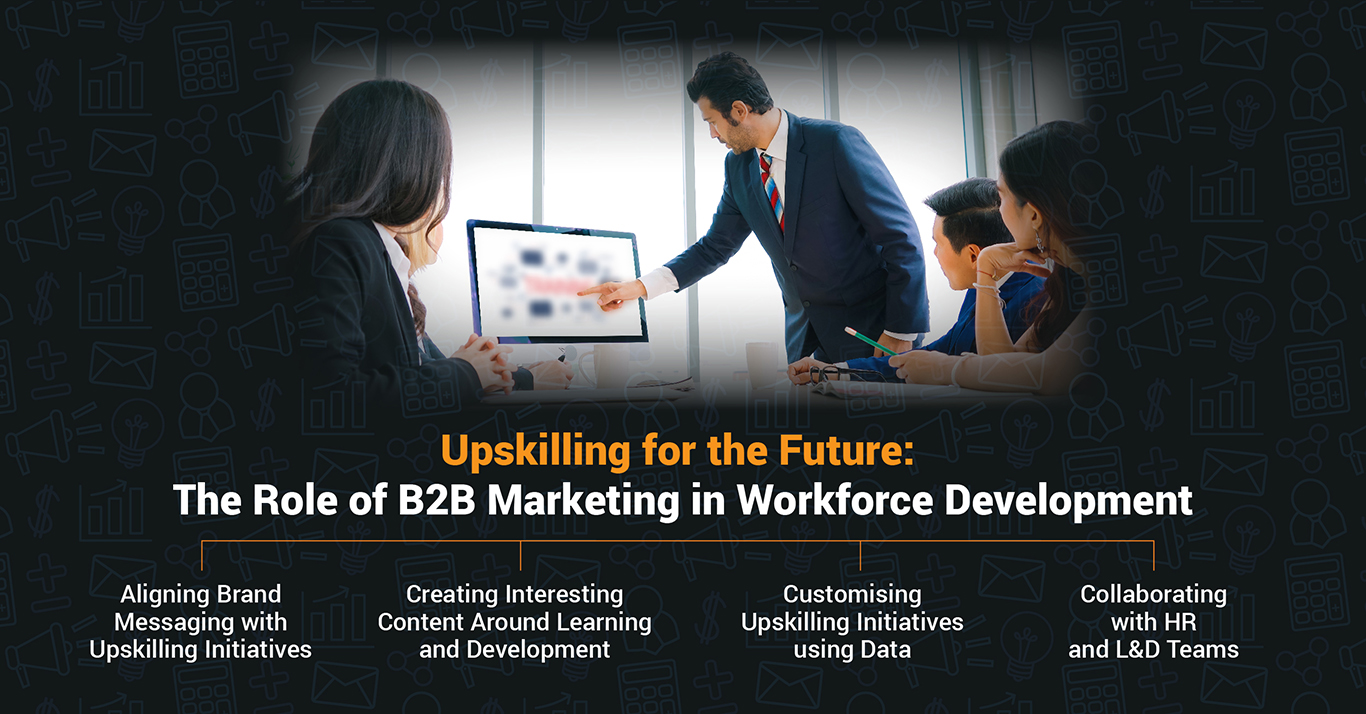
27 Sep Upskilling for the Future: The Role of B2B Marketing in Workforce Development
Organizations that prioritize workforce development through continuous skilling will succeed in the constantly changing business environment.
Chief Marketing Officers (CMOs) have responsibilities that go beyond standard marketing duties. These include nurturing talent and streamlining marketing strategies in sync with the company’s upskilling program.
In this blog, we’ll explore the crucial role B2B marketing plays in workforce development, and how CMOs can be at the forefront of this revolutionary movement.
The Rising Importance of Upskilling
As automation, AI, and other transformative technologies reshape industries, the skills necessary to prosper in today’s market are continuously changing. “According to a report by the World Economic Forum, 50% of all employees will need reskilling by 2025”. This completely new requisite for upskilling gives an opportunity to businesses to not only future proof their workforce but also take a leap in talent retention and organizational growth.
However, many businesses fail to understand the link between upskilling and B2B marketing. CMOs, can influence both internal and external stakeholders. By leveraging marketing channels, they can promote continuous learning, grow a skilled workforce, and drive business success.
How CMOs Can Leverage B2B Marketing for Workforce Development
1. Aligning Brand Messaging with Upskilling Initiatives
CMOs should begin by making sure that the company’s brand messaging is in sync with its commitment to workforce development. Emphasizing upskilling as a fundamental business value not only draws in top personnel but also communicates to partners and clients that the organisation is prepared for the future. B2B marketing teams can convey the value of a talented workforce and the company’s commitment to developing talent through content marketing, social media campaigns, and thought leadership articles.
For instance, incorporating staff success and skill development stories into case studies, corporate blogs, or testimonials can highlight a culture of continual learning and humanise the business. This not only improves the company’s reputation but also motivates staff members and potential customers.
2. Creating Interesting Content Around Learning and Development
The content marketing strategy plays a vital role in workforce development. CMOs can create content that focusses on topics like skill acquisition, leadership development, and digital transformation in addition to highlighting the company’s thought leadership in the sector, blogs, podcasts, and webinars on the newest trends in the business or skills training sessions can encourage staff members to explore upskilling.
One way to establish the company as a learning-driven leader is to provide webinars on new marketing technology or manuals on how to use data analytics. CMOs can encourage workers to take charge of their professional development by offering training content that fosters a growth-oriented and learning-oriented mindset.
3. Customising Upskilling Initiatives using Data
Workforce development and marketing have changed dramatically with the introduction of AI and data analytics. CMOs can tailor upskilling initiatives to each employee’s specific needs by utilising data-driven insights. Workforce development programs can be modified to provide unique learning paths that correspond with the aims of individual employees and the broader objectives of the firm, much like personalised marketing campaigns that target certain client segments.
Furthermore, it is possible to incorporate learning management systems (LMS) and upskilling platforms into the marketing plan to offer employees personalised learning experiences. To guarantee the efficacy of the material and training provided, CMOs can leverage data to monitor the learning progress and engagement of their staff.
4. Collaborating with HR and L&D Teams
Collaboration between departments is necessary for a workforce development program to be successful. Upskilling initiatives can be developed and promoted by CMOs in collaboration with teams from HR and L&D. CMOs can assist in internal promotion of the company’s training initiatives, boosting staff participation and engagement, by coordinating marketing strategies with L&D goals.
The scope of this partnership is not limited to within. HR and CMOs can work together to emphasise upskilling as a crucial value proposition for luring top talent and to promote the company’s learning culture as part of the recruitment marketing strategy. Potential hires will be assured that upskilling is an integral part of the company culture and that the organisation is committed to supporting employee progress.
CMOs now have a more crucial role in the digital transformation age than they did in the past. Their role is to shape and promote the company’s workforce development initiatives and guarantee that the organisation has the skills required for future success. CMOs can promote a culture of learning, improve employee retention, and propel long-term corporate success by coordinating B2B marketing with upskilling programs.
At The Thirsty Crow Marketing Services, our mission is to enable CMOs to use creative marketing to strategically approach workforce development. Visit our blog page to learn more about how B2B marketing can change your workforce as well as your business.



No Comments